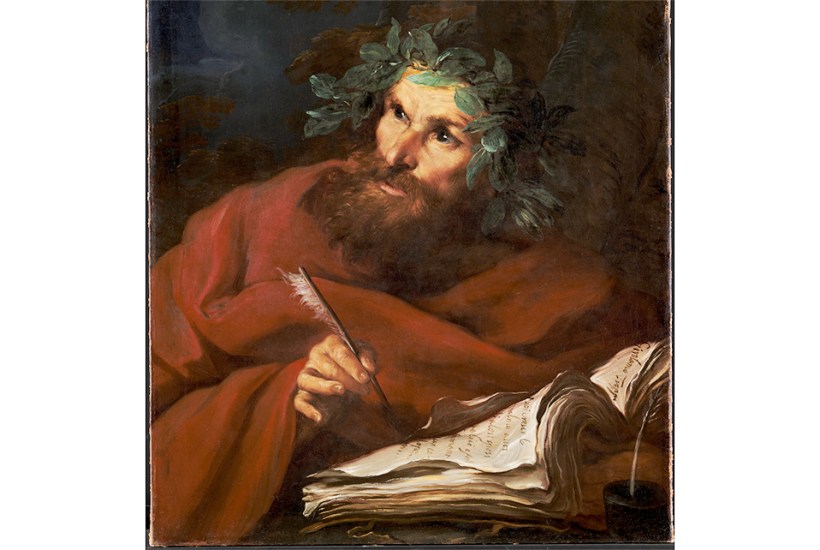According to legend, Vergil declared of himself ‘Mantua me genuit, Calabri rapuere, tenet nunc Parthenope: cecini pascua, rura, duces.’ (‘Mantua bore me, Calabria took me; now Naples holds me: I sang of pastures, fields, and leaders.’) In her rigorously researched biography, the American classicist Sarah Ruden shows that this is largely true – even if the author of the Aeneid was in fact born 30 miles from Mantua, in a little village called Andes, in 70 BC.
Ruden must necessarily rely on Vergil’s most influential biography, written by Suetonius more a century after his death. And there’s no reason to doubt the skeleton of Suetonius’s life: that Vergil was unmarried, with no children; both his brothers died when he was young; his father went blind; and he also had a half-brother, Valerius Proculus, through his mother, who is thought to have remarried after her husband’s death.
There are debates about Vergil’s background. Suetonius says he had lower-class parents; but some critics have suggested his father was from the grand equites class. And in later life Vergil certainly moved among the great and the good, including the greatest of them all – the Emperor Augustus.
Vergil assumed the toga of manhood at 15, went to school in Milan and studied philosophy in Naples rather than Athens (the usual gap-year destination for smart Romans), but his genius elevated him into elite circles. In Naples, he lived near other literary grandees, although he often withdrew to Sicily and Campania.
Suetonius also suggests that Vergil was gay. Not only was he unmarried but he was ‘of desire more inclined than usual towards boys’. Vergil was nicknamed ‘Parthenias’ (‘Virgin’), a pun on his name, which sounded like virgo, Latin for the Greek word parthenos, meaning a sheltered, unmarried girl. All in all, he comes across as a deeply sympathetic figure: gentle, shy, chronically ill and a genius, his intellectual powers increasing as he grew older.
The Appendix Vergiliana, a collection of his early poems – if they are all by him – has been much criticised, as Ruden shows in her careful analysis. But then came the Eclogues and the Georgics, showing his gift for singing about the pascua, rura – those pastures and fields. And then there was the masterpiece, the Aeneid, which Vergil was still polishing when he died in Brindisi in 19 BC, aged 50. On his deathbed, he asked for his scroll cases which contained the Aeneid, wanting to burn them. Luckily, Augustus overruled him.
Even though the Aeneid wasn’t finished, Vergil was already celebrated by the time of his death. Just before he died, he set off for Athens to finish the epic. There he bumped into Augustus and accompanied him to Megara, where he caught his final illness in the intense heat. He refused to postpone that fatal voyage to Brindisi, where he died on 21 September, when southern Italy can still be punishingly hot.
Ruden is a considerable scholar, who conveys the brilliance of the Aeneid concisely – although I could have done with more Latin. Even non-Latin readers like little chunks of the lovely language. She ably translates Rome’s paramount mission, as described in Book 6: ‘Sparing the conquered, striking down the haughty.’ But how much more stirring the Latin is: ‘Parcere subiectis et debellare superbos.’ Ruden is also guilty of the great fault of modern academese – using too many Latinate words, one shared by classicists and non-classicists alike – and comes up with sentences such as: ‘The Platonic angle, the idealisation of impulses that were basically pederastic, also manifests.’
She lays out the known details of Vergil’s life clearly enough, but the problem comes with her attempts to fill the gaps. She declares: ‘As a translator of Vergil… I probably know better than anyone alive how it feels to spend time as he reportedly did.’ This belief in her genius sparks her into extreme conjecture (‘Perhaps the poet committed virtual suicide in a handy but discreet way, simply by sending his litter away or refusing a drink or a dip in cool water.’) So it’s hard to agree with her when she robustly says: ‘I would not push my own speculative reconstruction of events.’ She would – and she does, far too often.
Got something to add? Join the discussion and comment below.
Get 10 issues for just $10
Subscribe to The Spectator Australia today for the next 10 magazine issues, plus full online access, for just $10.
You might disagree with half of it, but you’ll enjoy reading all of it. Try your first month for free, then just $2 a week for the remainder of your first year.








Comments
Don't miss out
Join the conversation with other Spectator Australia readers. Subscribe to leave a comment.
SUBSCRIBEAlready a subscriber? Log in